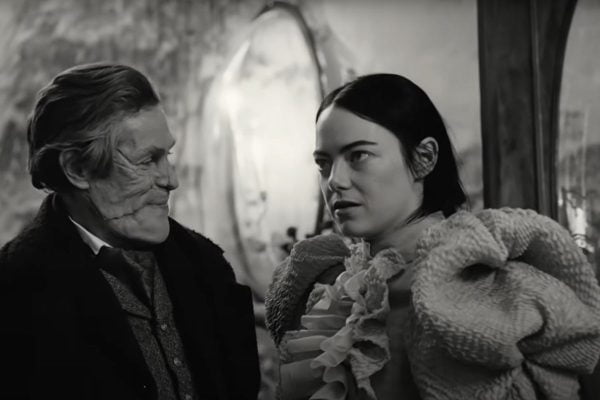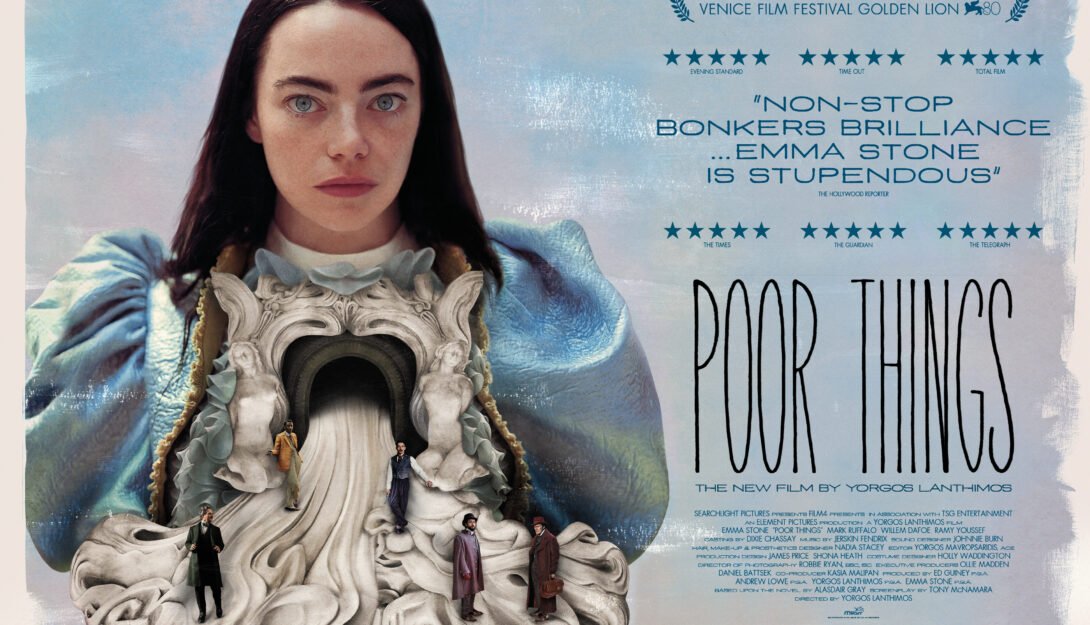For those wanting a visually luxurious spectacle, then Giórgos Lánthimos latest offering, Poor Things, is one to watch. The film gushes with gorgeousness. The score, sets, and costumes are a feast for the senses. The performances are brilliant. Politically, however, it is an idealist fantasy.
The movie is an adaptation of a 1992 novel of the same name by Alasdair Gray – itself a reworking of Mary Shelley’s Frankenstein, with references to Shelley’s personal and political life.
Lánthimos, however, updates this story to present a postmodernist ‘solution’ to women’s liberation.
[WARNING: THIS REVIEW CONTAINS SOME SPOILERS]
Blank slate
The plot follows the adventures of Bella, a women who has the brain of her unborn baby transplanted into her head after she commits suicide.
As her unblemished mind matures, Bella develops a taste for exploration: of the world, of ideas, and of her own body.

The men in her life, meanwhile, are completely infatuated by her naivety, spontaneity, and dazzling joie de vivre. Yet they also attempt to restrain her, physically and morally, and selfishly keep her for themselves.
In this respect, Poor Things cleverly inverts Hollywood’s ‘manic pixie dream girl’ rom-com trope. The perspective here is centred around the eccentric, hedonistic Bella, who is shown becoming wise and eloquent throughout the course of the film. Her misogynistic admirers, meanwhile, become increasingly possessive and petulant.
“There’s a general tendency to try to control [Bella],” Lánthimos explains. But her consciousness is a blank slate, so she is “free from convention and has no guilt, no shame, no judgement about herself or other people,” the Greek director adds.
Pursuing freedom
The political message of Poor Things is therefore clear. Bella’s experiences demonstrate that we have “the ability to make choices and live by [our] own rules and not society’s,” claims actress Emma Stone, who brilliantly plays the film’s protagonist.
At one point in the film, for example, in need of an income, Bella decides to work in a brothel. Rather than feeling exploited, she feels liberated.
She absorbs all of the progressive ideas and values of the day, rather than those of the degenerate men who frequent her chamber. And importantly, she now has the time, money, and energy to attend socialist meetings, read philosophy, observe medical lectures, and plot her course for freedom.
“I am my own means of production,” she proudly states to a stalking ex-lover who tries to chasten her. But this is a far cry from the degrading, oppressive reality of prostitution.

Later, Bella is whisked off by her pre-reanimation husband. He is a military man, embodying the brutality of the ruling class. He locks her up in his palace, where the staff are on the brink of revolting.
Angered by her new constraints, Bella decides to escape from her tyrannical husband: shooting him in the foot, chloroforming him, and then transplanting a goat’s brain into his head.
Following this, she lives happily ever after, deciding to pursue the same scientific path as her ‘creator’, by studying to become an anatomist.
Revolution and emancipation
The conclusion that the viewer is encouraged to draw is that emancipation is an individual endeavour. To free ourselves from oppression, Poor Things suggests, we simply need to alter our ideas; to change our minds and break free of the ‘social constructs’ that hold us down.
Revolutionaries, by contrast, understand that our consciousness is a product of our conditions. To end oppression, we need to do more than personally reject social norms – we need to collectively transform society.
By the end of the film, Bella may have liberated herself. But the suffering masses outside of the walls of her utopia – who she encounters and cares about – remain subjugated and impoverished.
This award-nominated film is funny and enjoyable; worthy of its accolades as an artistic piece of cinema. But its postmodernism and idealist outlook are ultimately disappointing and disarming. Only the revolutionary ideas of Marxism can offer a way forward in the fight against all forms of oppression.






